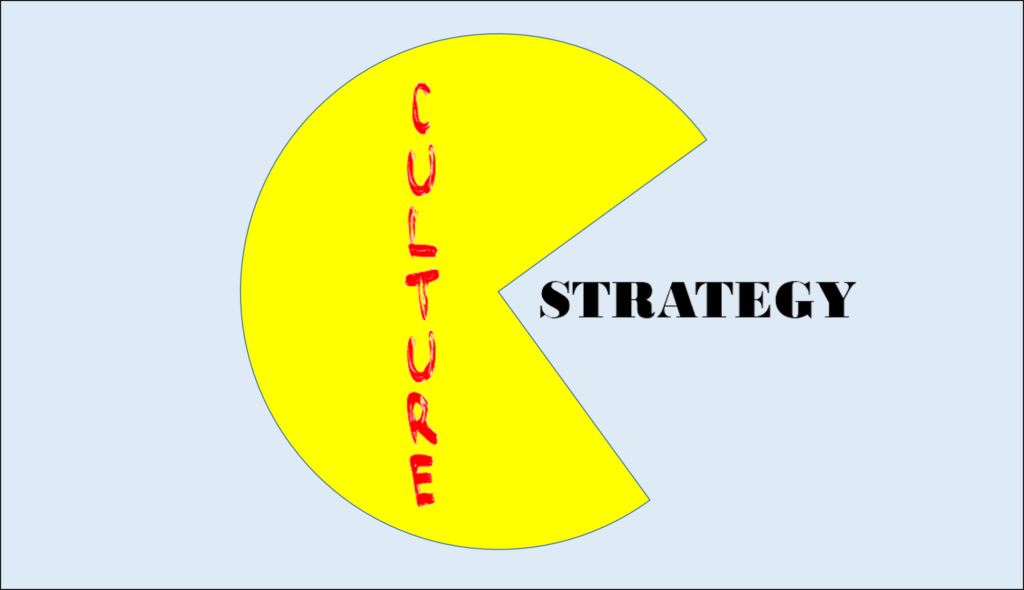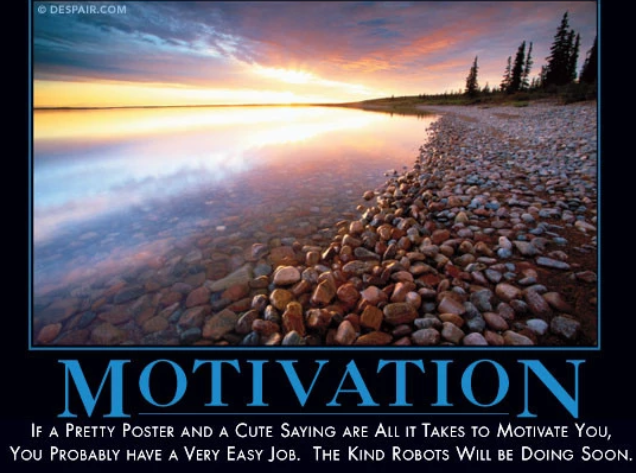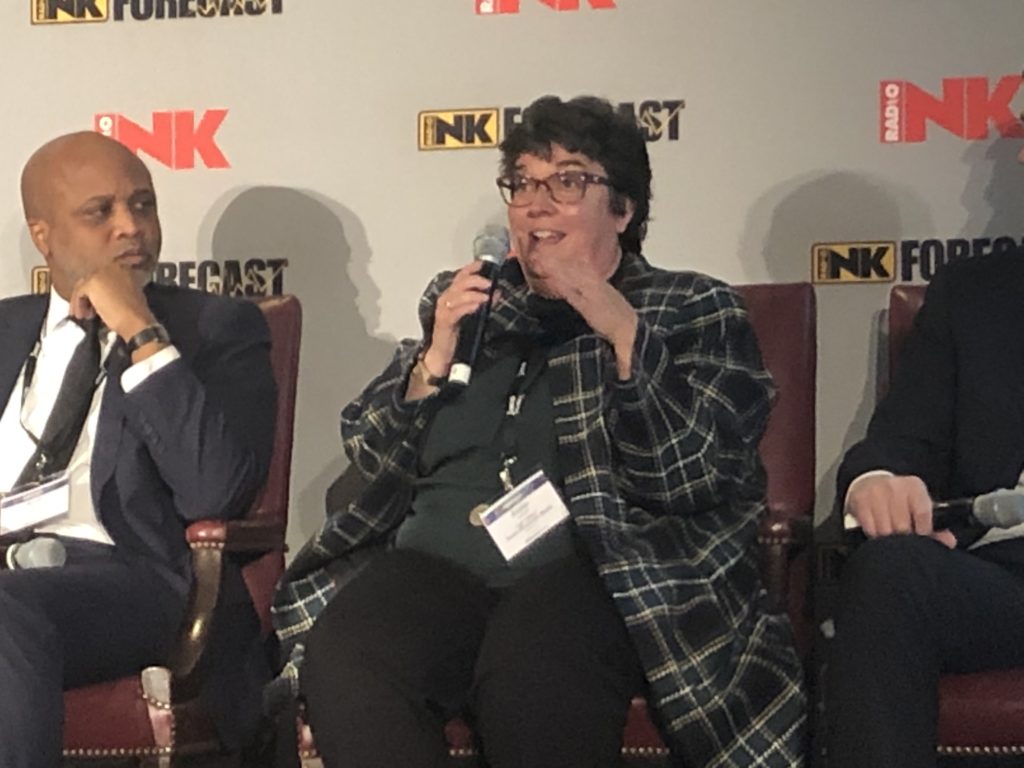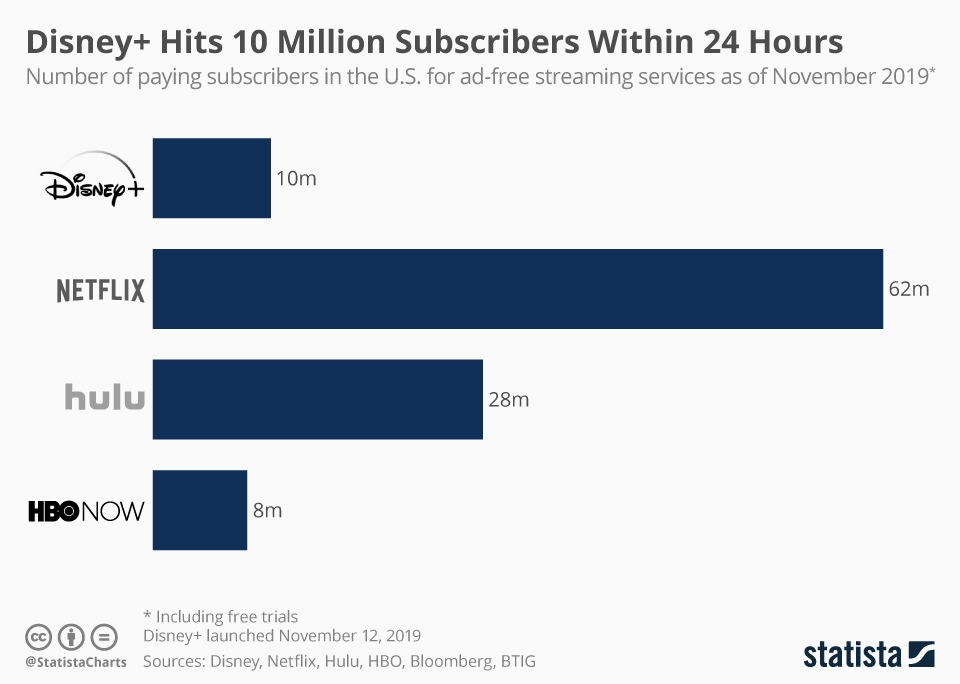
I see those “Success” posters in cubicles and conference rooms all over the country – the ones with those pithy business phrases designed to motivate the troops. But the fact there’s an entire parody campaign designed around these motivators tells you about the level of cynicism in the workforce.
You can visit the aptly named company, Despair, to peruse an entire series of “demotivators” – posters that are loaded with sarcasm, desperation, and discouragement. In fact, there’s still time to customize a 2020 calendar with your pet negative phrases.

That’s why I’m typically cautionary about the “company culture-building” phrases that litter Twitter and Facebook. Sure, they are well-meaning, but many simply fall flat because they’re banal, overused, or just too darn obvious.
But then there’s this one, first coined by Peter Drucker, and adopted by many in the business world, including Ford’s former CEO, Mark Fields.
Culture eats strategy for breakfast.
And one of my favorite quotes (maybe it’s a poster, too) is from Lewis Gerstner, Jr., who used to run IBM:
“The thing I have learned at IBM is that culture is everything.”
Yet, the thing I have learned when working with executive teams at both radio and non-radio companies, is that culture almost always takes a back seat to strategy. It’s rarely considered, often on the back burner, instead focusing on the “big stuff.” We spend so many of our waking hours and most of our financial and human resources developing and sharpening the strategy, doing our goal-setting, and conjuring up so-called “best practices,” we often leave the notion of company, corporate, or station culture to chance – or ignore it altogether.
If nothing else, this blog – and the ongoing tone on social media – has taught me there’s rampant cynicism out there. Sure, many of those who have been personally downsized, phased out, or displaced are understandably angry, disillusioned, or have an ax to grind.
But many current employees collecting paychecks, attending meetings, and otherwise going through the motions in radio can relate, wondering if the company culture will ever be addressed head-on.
I thought of the disconnect between the two, while reading a sponsored article (yes, they sometimes contain substance) from Cognizant Interactive called “3 Imperatives: Transform Your Business To The Experience Economy” by Deepthi Prakash, It’s a nice piece of content marketing.
The main point of this piece – and this is nothing new – is that success is “about the customer’s expectations – not yours.”
That’s something radio has struggled with over the years. Audience research is less about satisfying listeners, and more focused on crafting programming to be most appealing and ratings-friendly. Most of the time, the customer experience is an afterthought.
But Prakash not only underscores its importance, but asserts that until brands “build the employee experience” (the italics are mine), the customer experience will suffer as a result.
We’ve talked about this in great detail in this blog. Now even the smallest radio companies have gotten the digital transformation memo. After spending the day yesterday at  Forecast 2020 in New York City, that’s one of the clear takeaways. An Erica Farber-led panel featuring small market broadcasters was highlighted by Kristin Cantrell, Owner/CEO, CapCity Communications/7 Mountains Media, who told the assembled masses of broadcast radio execs she “sees opportunity everywhere I look.”
Forecast 2020 in New York City, that’s one of the clear takeaways. An Erica Farber-led panel featuring small market broadcasters was highlighted by Kristin Cantrell, Owner/CEO, CapCity Communications/7 Mountains Media, who told the assembled masses of broadcast radio execs she “sees opportunity everywhere I look.”
At least in digital. Because across the board, radio broadcasters are seeing traditional spot revenue flatline, while digital dollars continue to expand. They’re watching tech companies erode their client base. And they know they need to adapt in order to survive.
But the “analog transformation,” as Clockwork‘s Nancy Lyons call it, is the people part. And it’s the hard part.
It’s not just about getting everyone on the same page. Mission statements on the wall make it clear what a company’s all about. Culture creation is a slower, tedious process that starts with example-setting at the very top of the organization, and then played out every day in the way the company does business.
As many CEOs have learned – often the hard way – culture matters, especially during times of disruption and transition.
Prakash reminds us employees are the ones who often interface and engage with clients, especially true in the broadcast radio business. And she makes this critical point:
“Before rolling out new programs to improve customer experience, it’s critical that you study the employee experience. You might be astonished to see how much customer experience improves once the employees’ does.”
This is tough turf – for radio and every business. The pressure that has spawned hand-wringing budget cutbacks and painful downsizing, has shaken many staffs to their cores.
Communication with employees has never been more important. And yet, those anonymous surveys companies are fond of conducting among their rank and file may  not be getting the job done. Many are simply skeptical their remarks (and criticisms) will remain confidential, perhaps a byproduct of the privacy concerns permeating all corners of the Internet.
not be getting the job done. Many are simply skeptical their remarks (and criticisms) will remain confidential, perhaps a byproduct of the privacy concerns permeating all corners of the Internet.
While it is time-consuming, arduous, and it doesn’t scale, perhaps broadcast radio’s executives would be well-served to embark on a 1-on-1 “listening tour” of their stations. That means visiting the markets and sitting down with employees in every cluster – without smartphones, laptops, and other distractions. I’m a fan of focus groups, of course, but when the topics are tricky (politics, for example), there is no substitute for interviewing listeners (or staffers) one at a time.
So much of the success of company innovations and initiatives comes down to the staffs at a company’s radio stations. Taking the time to test the local waters, making sure everyone understands the imperatives and the urgency is a key component in facilitating change at the local level. From adjusting incentives and bonuses to work loads to handling new tasks, it is of critical importance the internal culture is solid and pressure-tested.

Prakash also suggests frontline employees need to be educated and trained. That was echoed in our “Transformation” presentation at the Radio Show in September by Julia Ziegler, the person chief responsible for helping WTOP – and its employees – make the turn and help lead the station through uncertain waters.
Sometimes in a rush to roll out new initiatives, companies get ahead of their skis, implementing change throughout the system without the necessary education about how employees responsibilities and expectations will change.
She warns that failure to do so risks the success of these bold new plans. Internal confusion simply leads to creating an overall bad experience for the three groups radio serves – listeners, communities, and advertisers.
And that means it all has to work the first time – seamlessly That can be a heavy lift for any company.
Even Disney.
While their new streaming Disney+ rollout was hands down a huge success – netting 10 million customers that first week. In the process, they passed HBO Now, and are moving rapidly into the hunt. That quantum leap immediately signals the media world that the folks famous or creating the Happiest Place on Earth are successfully moving into the content distribution arena, with their sights set on Hulu and the big dog, Netflix.

Except there was much reported unhappiness. Despite having the incredible content so many were excited about, technical issues when the platform launched were numerous and notable.
They included glitches with the streaming itself, log-in problems, and even a reported hacking issue. A problem with the aspect ratio of “The Simpsons” created unintended cropping that excluded some of the content. Even casual viewers noticed it.
All this prompted this statement from a Disney spokeswoman:
“The consumer demand for Disney+ has exceeded our high expectations. We are pleased by this incredible response and are working to quickly resole the current user issue. We appreciate your patience.”
Ugh.
It’s hard to know the source of these fails. But when you’re talking about one of the world’s great content creators with an impeccable brand image, it’s sobering to see  these blocking and tackling issues crop up when a key new platform launches.
these blocking and tackling issues crop up when a key new platform launches.
But that suggests that change is hard, and the people tasked with pulling it off are people, just like you and me. These big initiatives create staff pressure and strain – whether you’re a great radio station in Minot or Milwaukee or you’re the Magic Kingdom.
All the strategy in the world doesn’t amount to much when culture problems permeate the organization.
And that’s an issue every media company serious about pulling off a transformation has to deal with. It’s both the the digital and the analog – that is, people.
So often, the company insists there are no culture problems. The employees and middle managers often beg to differ.
And my companies aren’t immune. We know this isn’t easy. Jacobs Media started as a purely radio programming consulting company, and jacapps began making apps for radio stations.
Over time, both have evolved. Expectations of our employees and the focus of what we do have evolved, as have the kinds of people we hire.
At Jacobs Media and jacapps, we also have some breakfast to eat.
- How Radio Can Improve Its Digital Content Batting Average - January 3, 2025
- Is It Time For Radio Broadcasters To “Thelma & Louise” Over The Demographic Cliff? - January 2, 2025
- Some Good News About Radio? Yes! - January 1, 2025




Company culture and morale..almost always the most UNDERRATED element of a organization’s importance. Great read.
What’s the old expression…”the beatings will continue until morale improves” 🙂
I’ve seen that philosophy in action, Dave, and the results are usually predictable. Heads end up rolling – especially the knuckleheads who think the way.
Great post, Fred.
I was 25 years old when I got my first management level job, I was scared to death. I called my car dealer father for advice, here’s what the old man told me:
“Don’t treat the hired help like the hired help.”
Great advice. It matches “be nice to people while on your way up – you’ll likely see them on the way down.”
I like to think I’m not heading south but I have ended up working with – and working for – pros who I met when they were interns.
I had lunch with an old friend last week, he owns a Jeep store, He told me nationally the number 1 complaint new car buyers have on the Customer Satisfaction Index Surveys (this is across all brands, BTW) is “The Widows On My New Car Weren’t Clean”
Seems pretty easy to fix, huh? Like radio the management culture is bad.
Or as a group dealer friend once said, “We’re the only business that fires the players instead of the coaches.” I told him, “It sounds like my business.”
That it does. Thanks for this, Robert – adds fuel to the fire.
This is an excellent article. It’s very relevant as we move forward, with a parent company hovering over small markets. More and more, the knowledge of the person living in the market is downplayed and mocked as “podunk” or the like. I actually had a consultant tell me that they don’t let “a fucking podunk market” choose what I play. He essentially told me they chose what WE play. It also goes hand in hand with making sweeping changes while grossly underestimating the impact it has on our ability to work together, as well as the stability of the stations and what REAL LIFE expectations of sales in a market. You can’t keep secrets, keep lying and expect to have incredible results. This absolutely comes in to play in the digital realm as well as over the air. Dumping new responsibilites with “training” that is a digital meeting and nothing else, contribute to a poor product, thus poor results. Attitudes like that contribute absolutely nothing to the growth of our medium, however, they may be considered the cause of death.
Wow, Tamie. That’s a disturbing story. As a consultant, you have to respect local market knowledge and instincts. That only helps the collaboration process.
Our company doesn’t work this way, nor do we think this way. Thanks for sharing this cautionary tale.
Excellent article! Sadly, I saw so much of what you just described happen at a large company over 10 years. I watched the culture slowly deteriorate a little more each year, even though our particular cluster was making good money for them. I had laughed at the movie OFFICE SPACE when it first came out. The tragedy was the company began resembling it in REAL LIFE more with each passing year.
Eventually I went to work for a private owner in a smaller resort area market and have happily enjoyed my career and outside life for the past 6 years. ZERO regrets! So many who held out too long— implementing whatever “initiative” happened to be the flavor of the week—- eventually were cut loose after years of loyalty and success. I hated to see it happen, but I saw it coming years before it did and was proactive. (And I’d had notable drive-time/programming success in several pretty large markets prior to coming there) I MUCH prefer working for my current owner who will actually TAKE my call versus the former constant “lurching around” from one panicky ill-planned corporate concept to another. In the end, my background and experience is appreciated, generously compensated, and valued at my current station cluster. We are not just “positions” awaiting elimination when spare change is needed from the conglomerate “couch cushions.” Also, I can actually BE a true part of the many communities I serve, rather than merely running a generic liner or two that “claims” I do at :33 each hour.
Great story! Thanks for sharing it and congrats on what has clearly been a smart move for you.
Another fantastic and relevant piece, Fred.
I’ll chip in with one of MY favorite recent quotes from Virgin founder Richard Branson:”Clients do not come first. Employees come first. If you take care of your employees, they will take care of the clients.” And of course HIRING the correct employees is crucial.
True, true, true. Thank you, Dave!